- Home
- William Ritter
Changeling Page 14
Changeling Read online
Page 14
“Clear ’em off!” Kull commanded, and at once the goblins were all around her.
A particularly tiny goblin wearing a pig’s skull for a hat grabbed the vine at Annie’s wrist. The scrappy creature tugged and gnawed on the pernicious coil until it finally released Annie and snapped around the goblin instead.
“Success!” the goblin squeaked gleefully as the vine slowly pulled her to the ground.
A fat goblin in a chain mail vest grabbed hold of the thick vine around Annie’s waist and soon found himself taking Annie’s place as its victim. One by one, the goblins coaxed her bindings off her and onto themselves until Kull was pulling with all his strength at the last cord binding her ankles, but the vine refused to yield.
“Kull, stop! Don’t worry about me, save Tinn!”
“I am, ya daft womern,” he barked. The cord finally jerked loose and he fell over backward into the mess. “Go!” he hollered.
Free at last, Annie raced toward Tinn. All around rang the yells, whoops, and snarls of countless strange creatures banding together to fight the bramble, but as she reached the center of the circle, all sounds ceased. A cushion of absolute silence met her as she knelt before her son.
YOU HAVE COME TO WATCH HIM DIE, the Thing’s voice boomed. The creature hovering just behind Tinn was the shape of a man, near enough, but it did not move like a man. It sagged and swayed, like an under-stuffed scarecrow.
Annie ignored the wretched creature and reached a hand out to Tinn’s face to pull the shadows off him. The shroud was not a single sheet, but a patchwork of ragged slices of darkness that melted together like thick molasses. They were so cold they burned Annie’s skin. Solid and smoky and liquid all at once, they slid through her grasp, clinging to her fingers and closing back over the boy’s face as quickly as she could pull them away.
HE IS NOT YOURS. NOT ANYMORE.
Annie abandoned her efforts to pull the darkness away and threw her arms around Tinn’s neck instead. It was like holding packed snow in the shape of a boy, but she did not let go. Tears welled in her eyes. She thought about winter nights, about tiptoeing into her boys’ room to pull the covers up to their chins so that they would be safe and warm in their beds.
Tinn had stopped moving.
YOU HAVE ALREADY LOST HIM.
Annie held her son tight. Hot tears rolled off her cheeks. Where they touched the shroud of darkness, the shadows began to melt away.
STOP, the Thing commanded.
Annie felt a tremble beneath her fingers, no stronger at first than a fluttering moth’s wings, but growing. She looked down to see a head emerging from the shadows. Beneath the shroud, Tinn’s face was gray-green. As she watched, wicked thorns grew from his skin. She winced as the barbs pierced her arms. But she did not let go.
Tinn lifted his chin, his eyes unfocused and full of confusion. “Mom?” he breathed at last.
And then he saw his own reflection in his mother’s eyes. “I don’t know how to control it,” he whispered plaintively.
Annie nodded and held him tighter. “It’s okay, Tinn.” He could have been made of fire and she would not have let him go. “I’ve got you.”
“I’m not—” His voice caught in his throat, each word crumbling like brittle straws. “I’m not your real boy. It’s Cole. It’s always been Cole.”
“Of course you’re my real boy.” Annie squeezed tighter still, closing her eyes against the pain of the stabbing thorns and the burning cold. “And you will always be my boy.”
Slowly, the cold ebbed, the barbs dulled, and Annie felt shaking hands hugging her back. She rocked Tinn in her arms until he finally stopped shivering, and when she bent to kiss his forehead, it was the dirty pink forehead she had kissed countless times in the past thirteen years.
Footsteps pounded behind them, and they both looked up in time to see Cole pelting across the charred ground. He nearly knocked them over as he joined the embrace, tears and laughter mixing as they pressed together. In that brief giddy moment, that hug in the eye of the storm, the cold fell away completely.
“See, huggin’ is na the sorta thin’ I’m good at,” Kull said from behind them. “Wouldn’a even have thought o’ it. Just na a hugger.” He limped up to them, free of the vines, but not without a few fresh scars. He gave Tinn a wink as the boy looked up at him. “Hello, lad. Nice ta finally meet ya properly.”
NO! The Thing’s voice boomed across the forest, and the cushion of silence around them was gone. All around them, the commotion of creatures battling the bramble returned. I WILL END YOU ALL!
“That’s enough!” cried a raspy, gravelly voice. Candlebeard stood atop a pile of vines right behind the Thing. “It’s over.”
YOU ARE A FOOL. WHAT DO YOU THINK IS GOING TO HAPPEN? DO YOU REALLY THINK THAT THESE ARE YOUR ALLIES? YOU THINK YOU ARE FRIENDS? THE GOBLIN WOULD SELL YOU OUT IN AN INSTANT TO SAVE HIS HORDE. THE WITCH WOULD BURY EVERY LAST ONE OF YOU TO PROTECT HER CHILD. THE WOMAN WOULD LET THIS WHOLE FOREST BURN TO ASHES IF IT WOULD SAVE HER FAMILY. YOU MISERABLE, BROKEN OLD MAN. DO YOU THINK THERE WILL BE A PLACE FOR YOU WHEN THIS IS OVER? AFTER EVERYTHING YOU’VE DONE?
The vines at Candlebeard’s feet began to climb up his legs. He did not struggle against them. He only watched as they slowly circled his body. From behind their barbs, his little candle quivered.
“I did everything wrong,” Candlebeard said. “But it’s never too late to do something right.”
Lights twinkled around the perimeter of the ashen circle as the other hinkypunks silently observed the proceedings.
“He would be proud of you,” Cole called across the vines. “He would be so proud.”
The flame in Candlebeard’s chest swelled. “Your father would be proud of you, too,” he replied. “You’re a boy worth coming back for.”
The light expanded until Cole found he could not look at Candlebeard directly, and in an instant the vines were aflame. From every side, dancing fires pulsed in concert with Candlebeard’s, and soon the bramble was burning all around them.
The heat stung Tinn’s cheeks, but even as the flames danced above their heads, a curious calm came over him. Fear and anger melted away, and in their absence he regarded the Thing with new eyes. The wretched creature looked very small now. It pulled the shadows closer, like a child tugging the blankets up to its chin.
“I saw you,” said Tinn, softly. “I saw what you are underneath. It’s okay. You don’t have to be afraid anymore.”
NO, spat the Thing. YOU DO NOT KNOW WHAT I AM! Its cloak of shadows was falling to pieces, molting and shrinking before Tinn’s eyes. The Thing, which had once loomed over Tinn, was no larger than a stray dog now, and getting smaller. It frantically pulled more shadows toward itself, and as it did so, the few unburnt vines around the clearing sagged and crumpled. YOU ARE THE ONE WHO IS AFRAID! it boomed.
“I was.” Tinn nodded. “I was afraid of all sorts of things—the woods and the witch and wild animals, and I was afraid of you. But I’m not afraid now. You don’t have to be afraid, either.”
WHAT ARE YOU DOING? The echoes had left the Thing’s voice, and it sounded much smaller now. Indeed, it looked like little more than a sooty house cat in a pile of old black socks. Still the shadows dropped away from it, melting like slivers of ice in the flickering firelight.
“You’re not in that place anymore,” Tinn told it. “You’re free.”
STOP TALKING. NO. NO. NO. The last of the shadows finally fell away, and the Thing stood before them, naked and shivering. It was no larger than a mouse, its snout pointed like a shrew’s, its ears drooping and tattered.
The fire was already beginning to die down, as quickly as it had started. The only motion from the vines was the occasional pop of a spark and the settling of the charred remains. The bramble was dead. In the drifting ashes, the tiny, defeated Thing quivered.
Tinn leaned down and tenderly scooped up the trembling creature. He could feel its tiny heart racing.
“I didn’t want to believe that we wer
e the same,” he whispered to the Thing. “But you were right. I come from an in-between place, too. Only, nobody ever came for you, did they? That isn’t fair.” The Thing wriggled to free itself, but Tinn cupped his hands together to contain it. “You did terrible things. It’s not up to me to forgive the things you did. But I am sorry that you suffered. You didn’t deserve that. You didn’t deserve to be turned into this.”
The trembling Thing turned its eyes to Tinn, twin beads of glistening black. And then, ever so gingerly, it opened its mouth and chomped down hard on the round part of Tinn’s palm.
“Ow!” Tinn dropped the Thing, and it raced away amid the vines.
“Otch! Get back here, ya wee demon!” Kull scampered after the creature, swatting and stomping at it fruitlessly as it flitted away under the ash and embers.
Tinn rubbed the place where the Thing had bitten him. It felt sore and strangely hot. The weight of the day’s adventures felt like it was pressing down on him all at once, making his head swim.
“Are you okay?” Cole was saying, but his voice sounded far away.
Tinn looked at his palm. The skin was soft—as soft as the fabric on his mother’s dress. It rippled and became a drab green again, and then rich brown hair sprouted along his arm. He could do nothing to control the changes. Tinn was finding it harder and harder to breathe.
His knees wobbled, and a moment later he felt his mother’s arms holding him again. He leaned into her. Even in the middle of the Deep Dark Forest, his mother smelled like baking flour and honey and . . . and home. He smiled blearily. He wanted to speak, but the words got lost before they ever found his mouth.
“What’s happening to him?” Annie said.
“My changelin’,” Kull said, reverently, “is comin’ back.” Tinn managed to turn his head to face the goblin. The whole forest was spinning. “When all this is done, ya’ll look like ya was always supposed to, lad,” the goblin told him. “Kin an’ kind. Ya’ll finally be one o’ us again. Ya’ll be the best of us.” He gave Tinn a toothy smile that he probably hoped was reassuring.
Tinn felt something, but he was not reassured. His tongue ran along the sharp teeth in his mouth, and his stomach twisted. He turned his glistening eyes back to his mother’s face. She was fading in and out of focus. Tinn was losing her. He wanted to speak, he wanted to call out before she faded away forever, but his throat was too tight and his mind too muddled.
His mother spoke one word, just before the world faded away. It was only one word, but it was a word Tinn needed to hear. His muscles relaxed, and his mother held him, limp in her arms. “Always,” she repeated. “Always. Always. Always.”
THIRTY-THREE
The voyage to the Hollowcliff Horde came to Tinn in waves and flashes as he drifted in and out of consciousness. There were trees and hills and big rocks, and soon they were winding down a narrow path along the face of a steep cliff. It was just the sort of thing Cole would have loved, Tinn mused, sleepily. Where was Cole? Were humans allowed into the horde?
When Tinn opened his eyes again, he found himself gazing up at a rocky ceiling in a dimly lit cave. The air smelled like seawater and something sweet—chocolate? He sat up. He was resting on a small bed. His hands had been treated and wrapped with soft linen. The skin beneath them was a pale, greenish gray, but it had stopped changing. Were his fingers shorter? In his mouth he could still feel sharp fangs. Was this who he was now? A few feet away, a goblin wearing a weathered felt top hat with a spray of bright red cardinal feathers tucked in the brim was pouring something from a steaming copper pot into little clay cups.
“Ah. Yer timin’ is perfect, lad,” the goblin said softly.
“Oh. Um. Who are you?”
“Name is Nudd, son of Gwynn, high chief o’ the Hollowcliff Horde, and maker”—he gave Tinn a wink—“of a grand hot cocoa.”
“You . . . you made me cocoa?”
“Aye.” The goblin handed Tinn a cup. “Drink up, lad. Yer brother’s had three already, and some cakes. Dinna worry. I have a few put aside fer you.”
Tinn took the cup, still staring at Nudd. “My brother? Is he here? Is my mom?”
“Aye, and the witches and a hinky. I had ta boot half the forest out of the cave when ya first arrived. Yer ma and brother took the longest ta convince. They’re just outside now.”
“Can I see them?”
“Soon enough. I think we need a wee chat first, just you and me.”
Tinn took a deep breath. He nodded. “If you don’t mind, Mr. Nudd, please—could you first tell me . . .” Tinn hesitated. “What do I look like?”
“Right handsome,” Nudd assured him.
“Handsome like a person, or handsome like . . .”
Chief Nudd pulled a stool over to the bedside and sat down. “Do ya know what ya are, lad?”
“I’m a goblin, aren’t I? A . . . a changeling?”
“That’s right. Do ya know what that means?”
“I . . . change?”
The chief took a deep breath. “Okay. Right. Basics first.”
Fable sat with her feet dangling off the goblin landing. Down below her, waves washed against the feet of the cliffs, and up above the last of the color was fading from the sky.
“Fable?” The boards creaked and swayed ever so slightly as her mother came to stand beside her. “Are you all right?”
“Mama, am I human?”
“Of course you are. You are my daughter.”
“But I’m something else, too, aren’t I?”
The queen pursed her lips. “Is this because of what that pesky thief, Kull, said about—”
“How does having a father work?” Fable turned to look at her mother at last. “Do I have a father?”
“This is neither the time nor the place for a delicate—”
“Tinn and Cole had a father. He went away, but at least they had one. Did my father go away, too? Is he human?”
“Fable . . .”
“Is he something else?”
“Fable, please.”
“I want to know what I am!”
The queen leaned on the weathered railing and turned her eyes to the stars. She breathed with the rhythm of the waves for several seconds. “You had a father,” she said, at last. “And, yes, he went away before you were born. But he doesn’t define who you are.”
“Are you mad at him?” Fable fidgeted with the railing. “For going away?”
“Furious,” agreed the queen, but her voice did not sound angry. It sounded sad.
“Was he a bad man?”
The queen tore her eyes away from the stars and lowered herself to sit beside her daughter on the creaky platform. She wrapped one corner of the warm bearskin cloak around Fable’s shoulders and Fable leaned into her mother. “Do you remember when I used to tell you bedtime stories,” the queen said, “about the other side?”
“So that’s what ya are,” Chief Nudd finished, “the most sacred of our kind—a living bein’ of luck and chaos incarnate.”
Tinn swallowed. He did not feel like chaos incarnate. He felt exhausted. “So it’s my fault,” he managed. “I’m the reason magic is draining away from this side of the barrier. That other place, the Annwyn, is pulling magic away because of what I am. A changeling.”
Nudd shook his head and clucked. “Nay, lad. The drain started before ya were born.”
“But my being born made it worse.”
Nudd took off his battered top hat and set it on the table. “Perhaps,” he admitted. “But like everyone says: what makes things worse today will only make things better tomorrow.”
“I’m pretty sure that’s not something people say,” said Tinn.
“Hm. Maybe it’s just goblins. Anyway, our ancestors thought they had it figured out. The changelin’ ritual solved everything. An earthly child stolen away, a magic child left behind. Balance ta both sides. Win-win.”
“Except for the babies,” said Tinn. “The ones you kidnapped to make it work.”
“Right.”
Nudd winced. “I want ya ta understand, my father taught me that na child on Earth was e’er so beloved as a child in the Annwyn. I believed him, too. The fair folk raise human children as their own—lavish them with gifts, fill their every wakin’ hour with joy an’ wonder. Life is short an’ miserable here on Earth, but children in the Annwyn can live two, maybe three hundred years. What sort of mother wouldn’a want her child ta live a long and glorious life in the Annwyn?”
“A mother who wanted to be a mother,” said Tinn.
Nudd nodded soberly. “Yer a sharp lad, Tinn.”
“Were they kind to you on the other side?” said Fable.
“More than kind.” The queen held her daughter’s arm. “I was their princess. I ate meals that tasted like sunbeams and wore dresses that shone like starlight. When I got older, they even taught me spells and charms. They smiled and laughed and applauded as I learned how to weave my own clumsy magic. One fairy gentleman smiled more kindly than the rest. He was young by fairy standards and fair by any.”
“He was fair?”
“That means he was handsome. He made no advances, but over time I started to wish that he would. Years passed. He waited for me. Some of the fairy folk who had once applauded my lessons lost interest in me, but he did not. He did not age. I did. When I was ready, I made my own advances. My fair gentleman did not protest.”
“Did you kiss him?”
“There was a courtship, and there was a wedding, and there was a wedding night, and then one day I found I had conceived a child of my own.”
“But did you kiss him?”
“Many times.”
Fable smiled up at her mother, and then crinkled her brow. Her mother’s eyes were glistening in the starlight. “Are these happy memories or sad ones?”
“Both,” said the queen. “They were happy and sad times.”
“Why were they sad?”

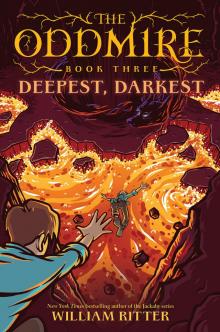 Deepest, Darkest
Deepest, Darkest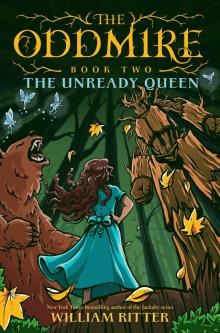 The Unready Queen
The Unready Queen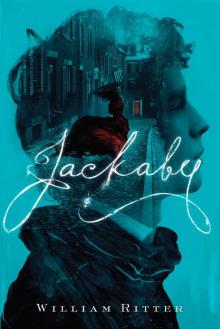 Jackaby
Jackaby Changeling
Changeling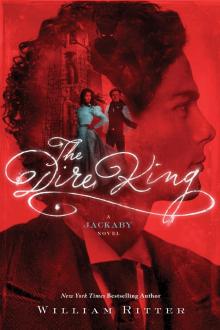 The Dire King
The Dire King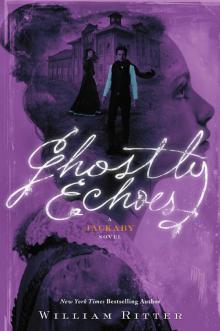 Ghostly Echoes
Ghostly Echoes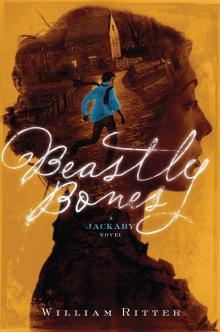 Beastly Bones
Beastly Bones